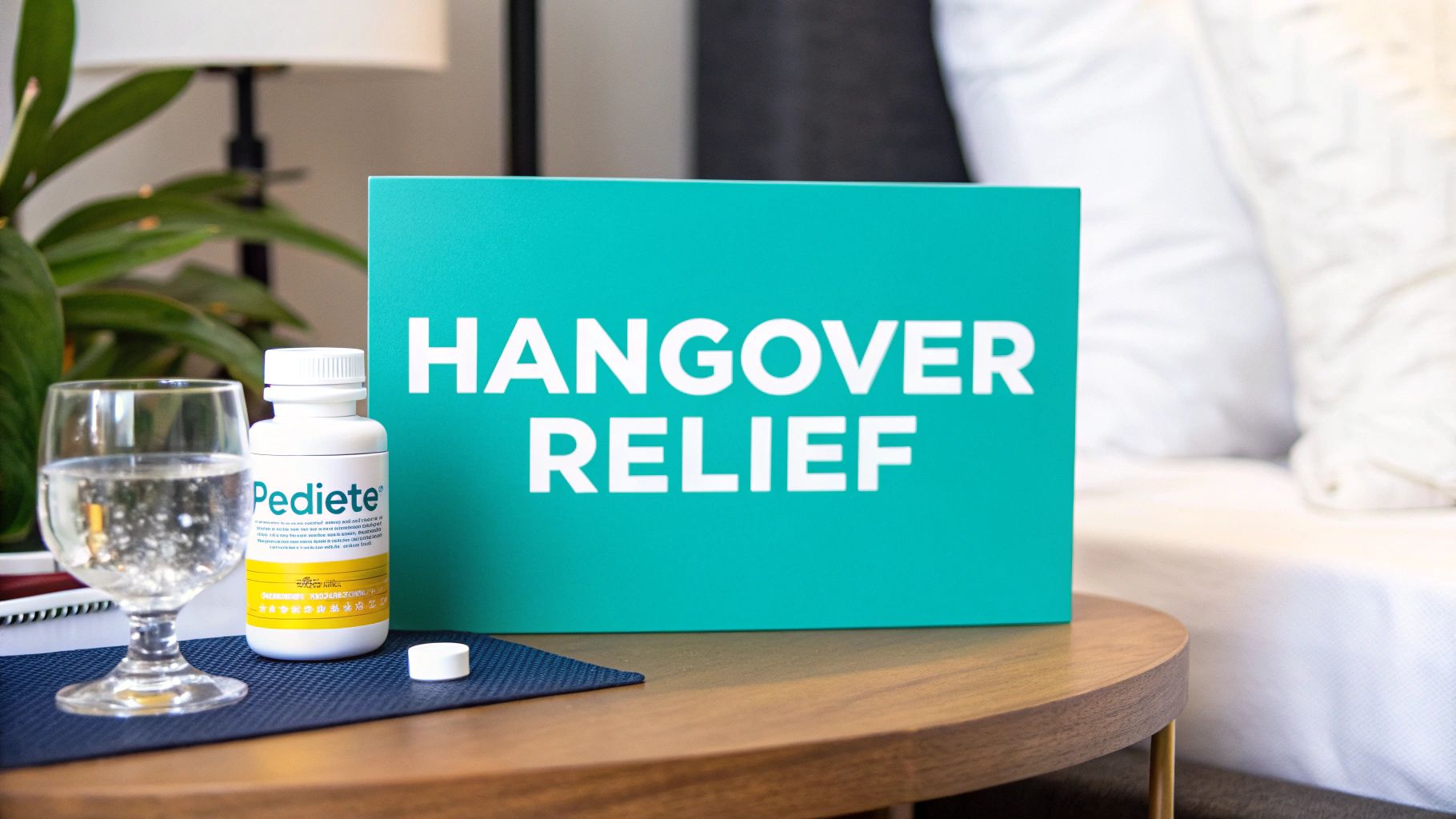

· By Annemarie
is pedialyte good for hangovers? Find Out Fast!
How Pedialyte Became the Unofficial Hangover Helper
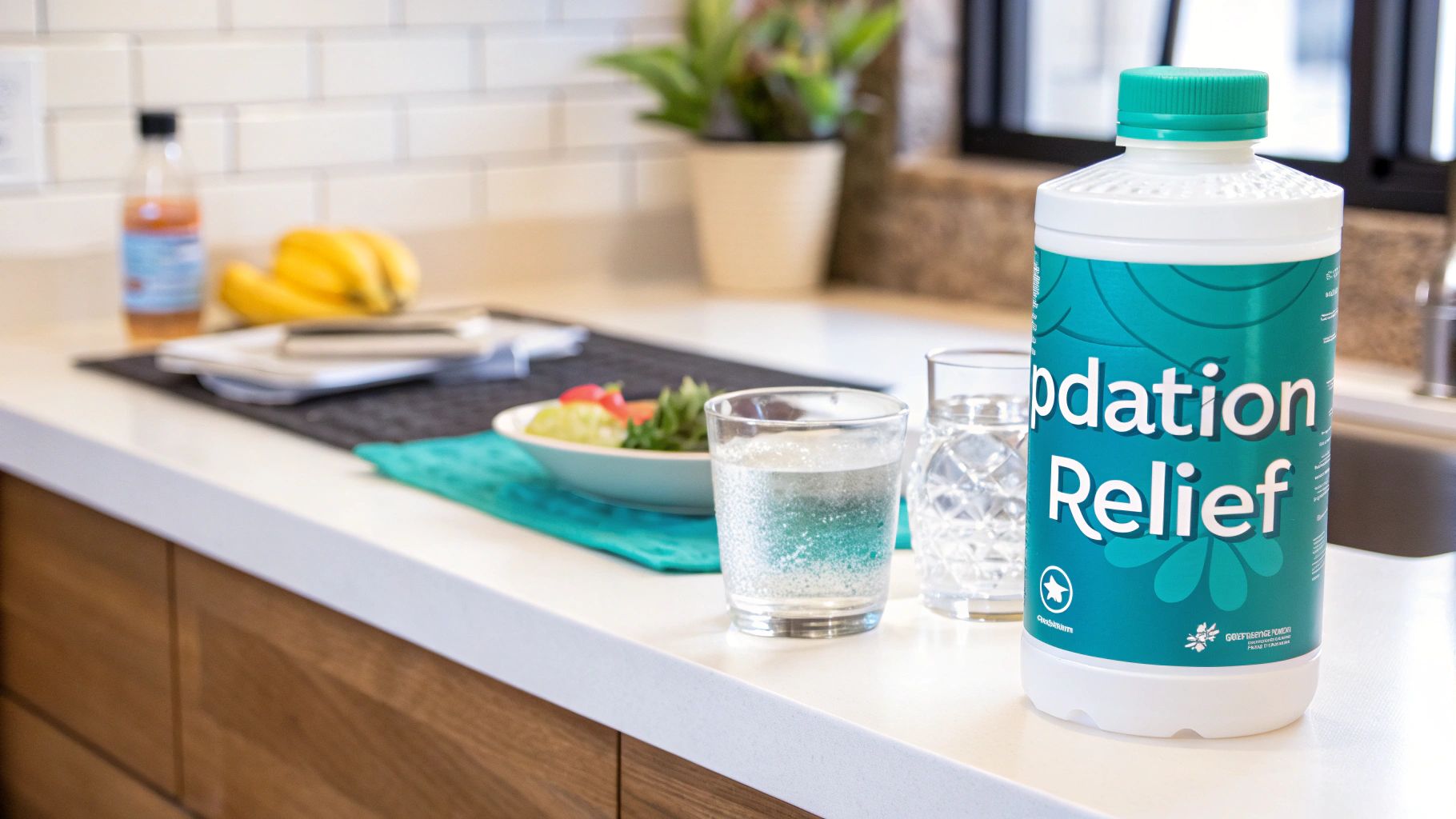
Pedialyte, a drink initially created for dehydrated children, has unexpectedly become a popular hangover remedy for adults. This once pediatric rehydration solution has transitioned into the go-to for post-party recovery, marking a noticeable shift in how people manage the after-effects of a night out. But how did this unexpected change happen?
From Nursery to Nightlife: A Cultural Shift
The journey of Pedialyte from the medicine cabinet to the party scene showcases how a product can find a new purpose beyond its initial design. Word-of-mouth and social media, especially platforms like Twitter and Facebook, played a key role in this evolution. Positive reviews and personal stories shared online significantly boosted Pedialyte’s visibility and appeal.
This organic growth transformed Pedialyte into a trending topic and a must-have for many after a night of indulgence. The transition highlights the impact of shared experiences and their influence on consumer choices. It's a testament to the power of online communities and how they can redefine a product's identity.
The Science Behind the Solution: Why People Swear By It
The rising use of Pedialyte for hangovers is linked to its ability to address a major symptom: dehydration. Alcohol is a diuretic, meaning it increases urination and leads to the loss of fluids and electrolytes. Pedialyte offers a blend of electrolytes, including sodium and potassium, along with dextrose (a simple sugar), to help restore these essential nutrients.
This rehydration process can ease common hangover symptoms like headache, fatigue, and nausea. It's important to remember, however, that a hangover is complex, with various contributing factors. Dehydration is just one piece of the puzzle.
While Pedialyte may offer some relief, it's not a cure-all. Other factors like sleep disruption and the buildup of toxins also contribute to the overall hangover experience. In recent years, Pedialyte has seen increased popularity as a hangover remedy, especially in the United States. This trend was observed in May 2015 with increased sales figures, showing adults seeking it out as an unusual hangover cure.
Although scientific evidence specifically supporting its effectiveness for hangovers is limited, Pedialyte’s ability to rehydrate and replenish electrolytes aligns with addressing dehydration symptoms often associated with hangovers. Learn more about Pedialyte for hangovers here. The lack of extensive research on its efficacy for hangovers means its use remains primarily anecdotal. However, its proven effectiveness in rehydration suggests it may offer some relief.
Unraveling the Biological Hangover Puzzle
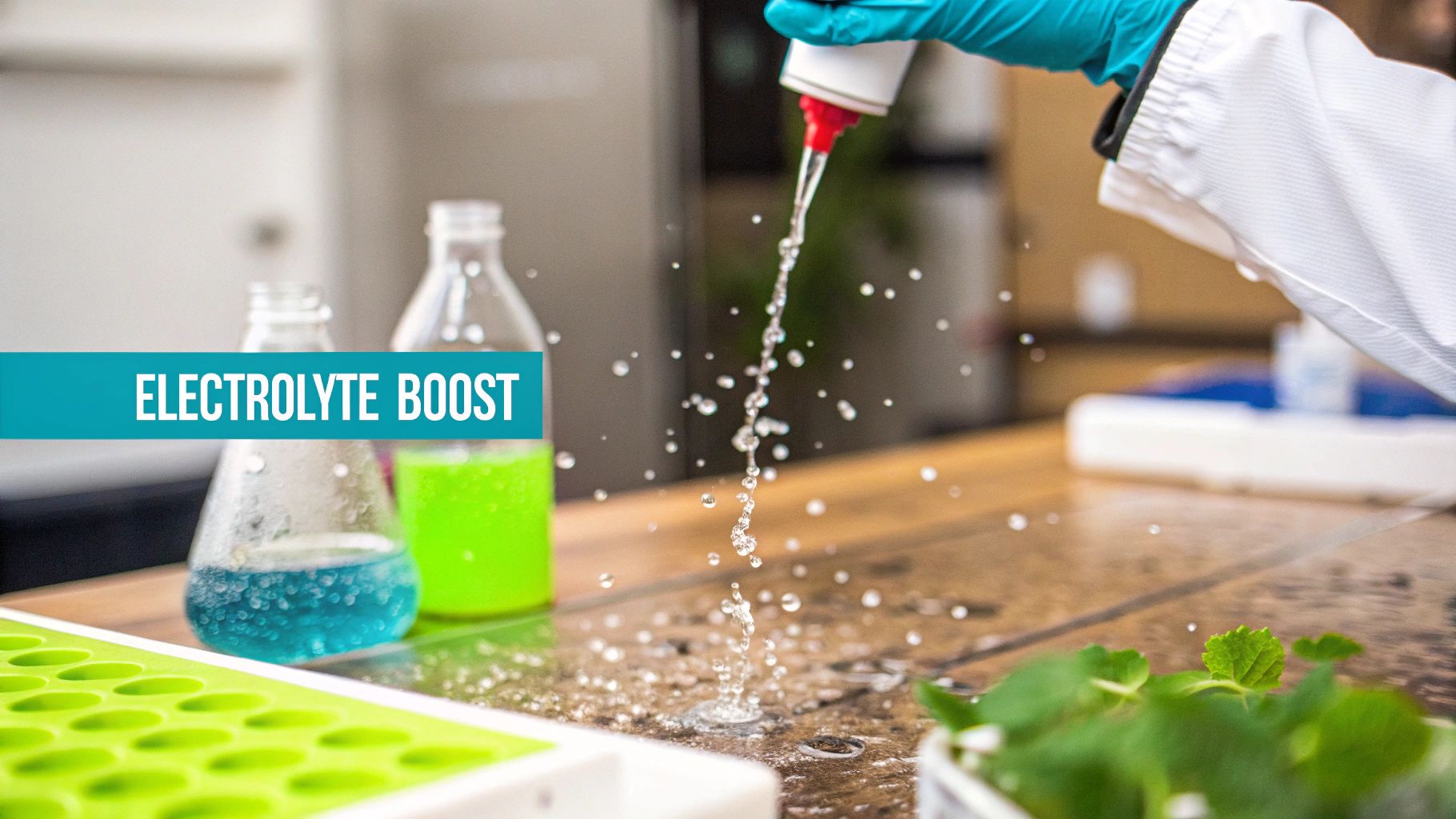
Hangovers are a complicated beast, a symphony of unpleasant symptoms. Dehydration plays a major role. Alcohol is a diuretic, making you urinate more frequently. This leads to a loss of fluids and electrolytes, throwing your body’s internal balance out of whack. This imbalance contributes to those familiar hangover woes. However, there's more to the story than just dehydration.
Beyond Dehydration: The Bigger Picture
Replenishing fluids is important, but addressing the electrolyte imbalance is just as critical. Electrolytes, like sodium and potassium, are essential for nerve and muscle function, hydration, and blood pressure regulation. When these electrolytes are depleted, it contributes to headaches, fatigue, and nausea. This is where electrolyte drinks, like Pedialyte, can be beneficial due to their specific formulation.
Alcohol also messes with your sleep architecture. Even if you manage to get some shut-eye, the quality of that sleep is likely poor. This disruption intensifies hangover symptoms, leaving you feeling drained and wretched.
The Role of Blood Sugar and Inflammation
Alcohol throws a wrench in blood glucose regulation, too. It can initially cause a blood sugar spike, followed by a crash, leaving you feeling weak and tired. Plain water can't fix this, highlighting the need for a more comprehensive recovery strategy.
Alcohol also triggers inflammation throughout the body, especially in the stomach and intestines. This contributes to nausea and other digestive problems commonly associated with hangovers. For a truly effective recovery, you need a multi-pronged approach. This means addressing not only dehydration, but also the broader physiological impacts of alcohol.
Understanding these interconnected processes explains why some hangover remedies are more effective than others. It also makes clear why simply drinking water often isn't enough. You might be interested in: How to master.... A more holistic approach is key.
Pedialyte vs. Competitors: What Actually Works?
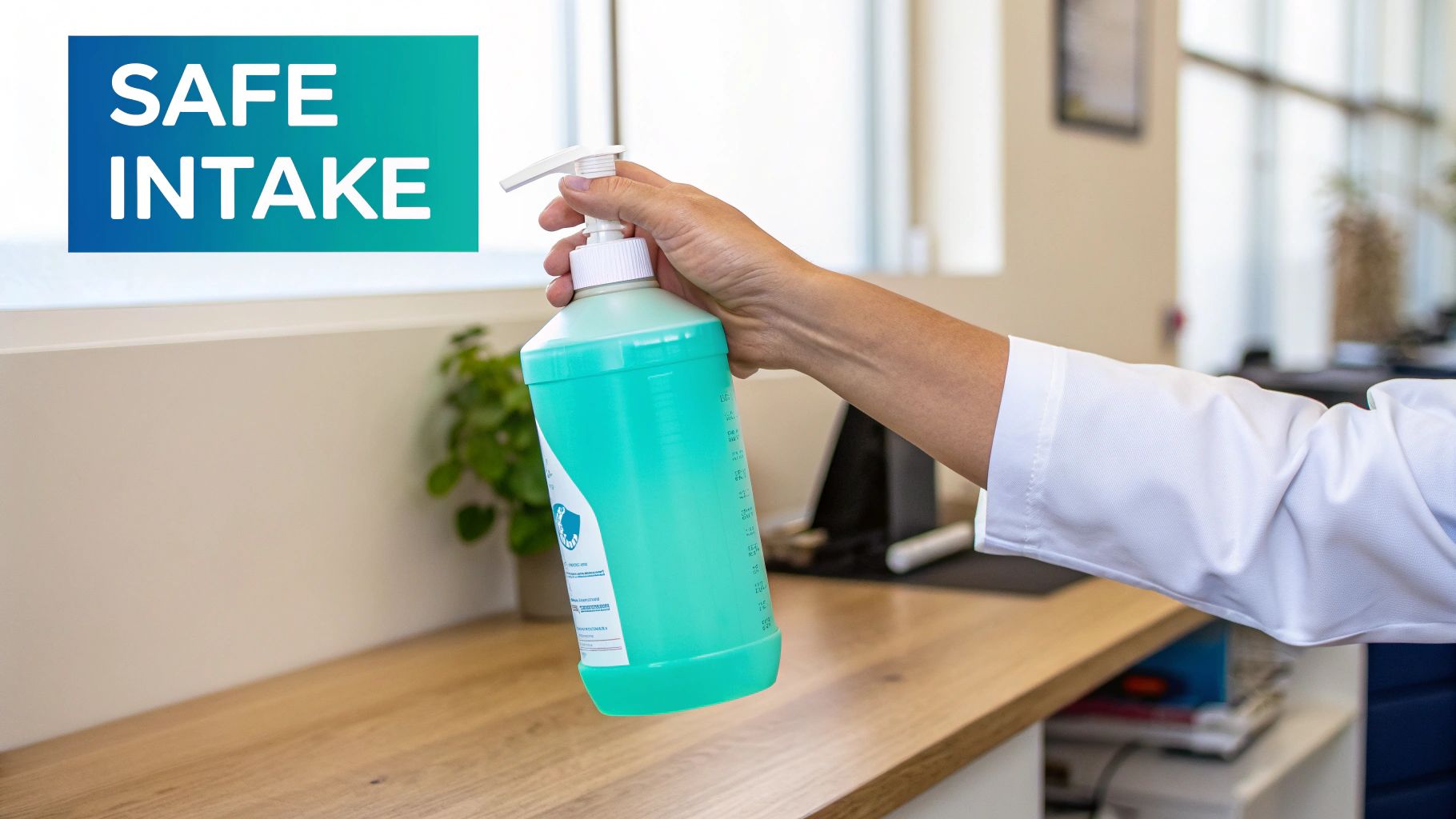
So, we know dehydration plays a big part in hangovers. This leads us to a crucial question: what's the best way to rehydrate? Plain water is a good starting point, but it doesn't contain the electrolytes lost due to alcohol's diuretic effect. This is where Pedialyte and other similar products come into play. But how does Pedialyte stack up against the competition? Let's compare.
Dehydration and Electrolyte Loss: The Core Issue
Hangovers often center around the need to replenish electrolytes. These essential minerals, such as sodium and potassium, are vital for normal bodily functions. Excessive urination caused by alcohol leads to a loss of these electrolytes, contributing to those unpleasant hangover symptoms. This is why Pedialyte, originally designed for rehydrating children, is often considered a potential hangover helper.
Think about the difference between drinking plain water and an electrolyte solution. Water hydrates, but it doesn't replenish those lost minerals. You might feel less thirsty, but other symptoms, like headaches and fatigue, can linger.
To understand how Pedialyte might impact hangovers, it's helpful to compare its composition to other beverages. Pedialyte boasts twice the electrolytes of popular sports drinks like Gatorade but contains less sugar. This is a plus, as excess sugar can actually worsen dehydration. This suggests Pedialyte could be more effective for quick rehydration, a critical factor in managing hangover symptoms.
While hangovers usually subside within 24 hours, Pedialyte may help alleviate dehydration symptoms more effectively than water alone. This is because water lacks a substantial amount of electrolytes. However, Pedialyte isn't a cure-all. It addresses dehydration but doesn't tackle other hangover issues like sleep disruption and stomach upset. For more on this, check out this article: Pedialyte for Hangovers.
Considering the Alternatives: Sports Drinks and Specialized Remedies
Sports drinks, although designed for athletic recovery, often contain high sugar levels. This can hinder rehydration. Specialized hangover products exist, but they often come at a premium price without necessarily offering significant benefits over more accessible options.
To illustrate the differences between Pedialyte and some common alternatives, let's look at a comparison table:
Pedialyte vs. Other Remedies: Electrolyte and Sugar Content
| Remedy | Electrolyte Content | Sugar Content (g/L) | Price Range | Effectiveness for Dehydration |
|---|---|---|---|---|
| Pedialyte | High (e.g., 45 mEq/L Sodium) | Relatively Low (e.g., 30 g/L) | $4-$7 per liter | High |
| Sports Drinks (e.g., Gatorade) | Moderate (e.g., 20 mEq/L Sodium) | High (e.g., 50-60 g/L) | $2-$4 per liter | Moderate |
| Water | None | None | $0-$2 per liter | Low |
| Specialized Hangover Products | Varies | Varies | $5-$15 per serving | Varies |
This table showcases the key differences in electrolyte and sugar content among various remedies. Pedialyte stands out with its high electrolyte and relatively low sugar content, potentially making it a more effective rehydration solution.
Weighing the Pros and Cons: Is Pedialyte the Best Choice?
Pedialyte provides a relatively balanced approach to rehydration, with a good electrolyte profile and lower sugar content compared to many sports drinks. It's important to remember that it's not a miracle cure. It targets dehydration, not other hangover symptoms like sleep disruption or inflammation. You can explore other products on this product sitemap. The best hangover remedy truly depends on individual needs and preferences.
By examining Pedialyte's strengths and weaknesses against its competitors, you can make informed decisions about hangover recovery. Focus on the science of rehydration and your body's specific needs after a night of drinking to determine the most suitable option for you.
The Real Impact on Your Hangover Symptoms
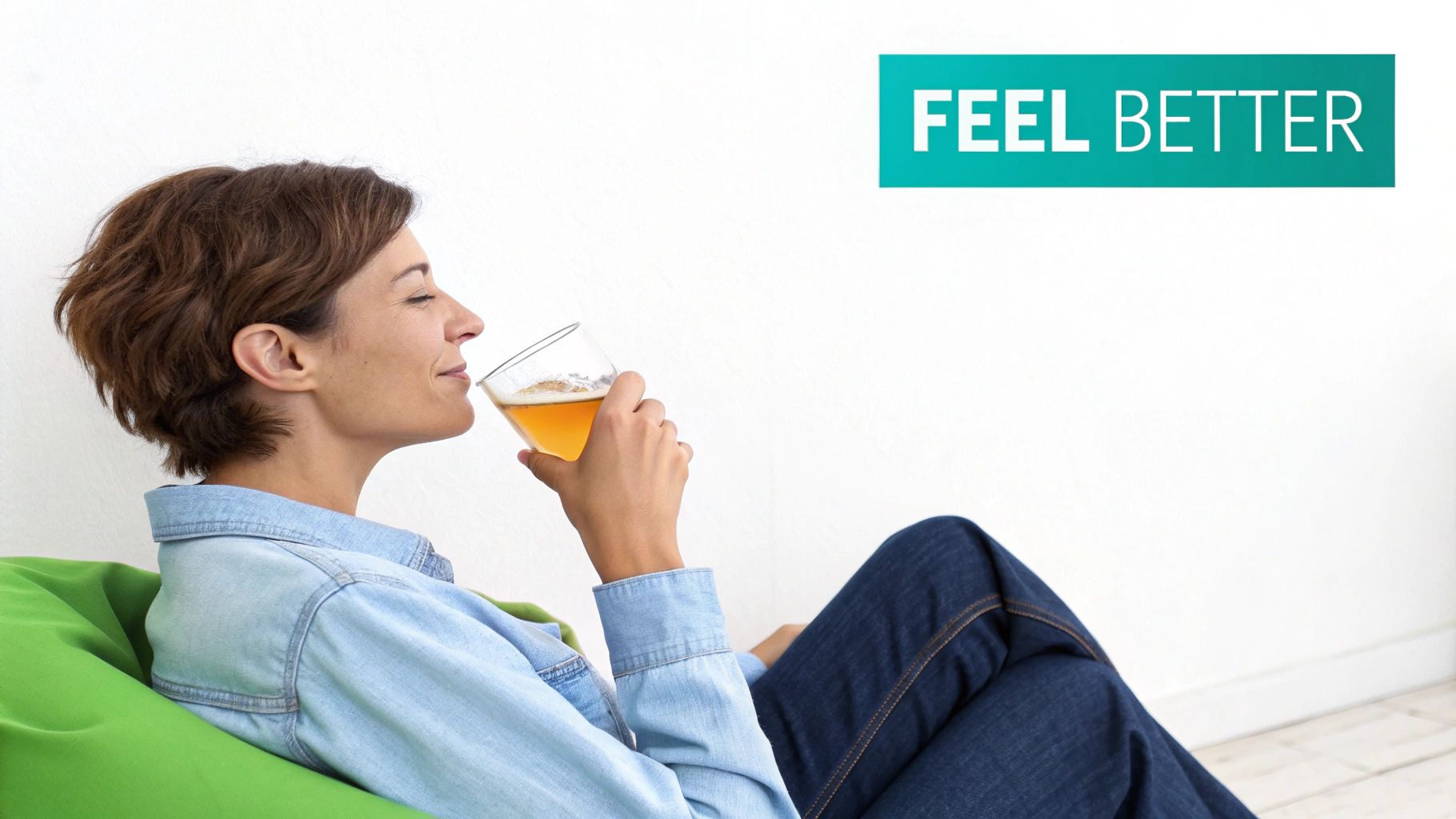
Pedialyte has become a popular hangover remedy, largely due to its ability to tackle dehydration—a major culprit in that morning-after misery. But how does it actually affect your specific symptoms? This section delves into how Pedialyte’s ingredients work within your body after a night of drinking. We'll explore its potential benefits and limitations, setting realistic expectations for its effectiveness.
Electrolyte Replenishment: Addressing the Imbalance
Alcohol acts as a diuretic, depleting crucial electrolytes such as sodium and potassium. These electrolytes play vital roles in nerve and muscle function, fluid balance, and blood pressure regulation. Pedialyte's electrolyte blend helps restore this balance, potentially easing symptoms like headaches, muscle weakness, and fatigue, which are often worsened by electrolyte imbalances.
Pedialyte also contains dextrose, a simple sugar that aids in electrolyte absorption. This quick absorption can offer faster relief from dehydration. However, it's important to remember that this benefit doesn't address other contributing factors to a hangover.
Symptom Relief: What to Expect
While Pedialyte targets dehydration, hangovers are complex and involve more than just fluid loss. This means Pedialyte isn't a magic bullet for every symptom.
To better understand its potential impact, let's review the following table:
To illustrate Pedialyte's effects on common hangover symptoms, let's consult the data below:
Hangover Symptoms and Pedialyte's Effect
| Symptom | Pedialyte's Potential Effect | Scientific Evidence Level | Expected Relief Timeline |
|---|---|---|---|
| Headache | Can help by restoring electrolyte balance | Moderate | Within a few hours of consumption |
| Fatigue | Can improve by addressing dehydration and electrolyte loss | Moderate | Gradual improvement over several hours |
| Nausea | Limited impact; addresses dehydration but not the direct cause of nausea | Low | May provide some indirect relief |
| Sleep Disruption | No direct effect; alcohol disrupts sleep patterns regardless of hydration | Low | No expected improvement |
This table highlights which hangover symptoms respond best to Pedialyte and which may require other interventions. While it can help with headache and fatigue by restoring hydration, it won't directly address nausea or sleep disruption.
Hydration vs. a Cure: Setting Realistic Expectations
Pedialyte is a rehydration solution, not a hangover cure. It can significantly improve dehydration-related symptoms, but it doesn't address other factors like alcohol's toxic effects or inflammation. This is a crucial distinction. While some relief is likely, don't expect Pedialyte alone to completely erase all your hangover symptoms.
For a more comprehensive approach, consider alternatives that target the broader physiological effects of alcohol, like Upside Hangover Sticks, which offer a more complete strategy for hangover relief. Combining Pedialyte with supplements like these can further boost your recovery.
Marketing Claims vs. Scientific Reality
Pedialyte has carved a niche for itself in the hangover remedy market. It focuses on rehydration without making direct medical claims about curing hangovers. This careful positioning allows the brand to appeal to those seeking relief without venturing into regulated health claims. But how did Pedialyte achieve this, and what’s the reality behind the marketing?
The Power of Perception: Shaping the Narrative
Pedialyte's marketing emphasizes proper hydration for overall well-being. It highlights benefits like improved mood, sharper brain function, and increased energy. These messages, while not explicitly about hangovers, subtly resonate with those experiencing alcohol's dehydrating effects. This indirect approach connects with the target audience without making promises it can’t scientifically support.
Social media campaigns often showcase Pedialyte in the context of fun social gatherings. This further solidifies its association with post-party recovery. This subtle connection reinforces the idea of Pedialyte as a helpful tool for bouncing back after a night out. You might be interested in: additional page resources.
Celebrity Endorsements and Social Media Buzz
Celebrity endorsements and social media trends have significantly shaped public perception of Pedialyte. When influential figures share positive experiences, it generates buzz and increases visibility, especially among younger demographics. This can create a bandwagon effect, where people try Pedialyte based on social proof rather than scientific evidence. This strategy has built a loyal following despite the lack of hangover-focused clinical trials.
Additionally, Pedialyte’s marketing strategy has been key to its adoption as a hangover remedy. In September 2019, market research highlighted its strategic positioning. This targeted not only athletes and individuals with diarrhea but also those experiencing alcohol-induced dehydration, particularly during celebrations. Discover more insights about Pedialyte's marketing strategy here. By focusing on the "post booze-cruise crowd," Pedialyte tapped into a niche market without needing scientific validation as a hangover cure. This tactic increased both its recognition and use among adults seeking fast rehydration.
Separating Fact from Fiction: What the Science Says
While Pedialyte undoubtedly helps with rehydration, a key component of hangover recovery, it's crucial to understand its limitations. Science doesn't fully support the idea of Pedialyte as a comprehensive hangover cure. Hangovers are complex, involving various factors beyond dehydration:
- Sleep disruption
- Inflammation
- Buildup of toxins
Check out our guide on hangover prevention strategies. Pedialyte primarily addresses dehydration but doesn't fully counteract these other factors. While it might offer some relief, it's not a magic bullet.
Therefore, managing expectations is vital. Pedialyte's marketing effectively highlights its rehydration benefits, aligning with addressing some hangover symptoms. However, it's important to remember it doesn't tackle all hangover causes. A balanced approach, combining rehydration with other recovery strategies, is likely the most effective way to manage hangovers.
Maximum Relief: Optimizing Your Pedialyte Strategy
Pedialyte can offer relief from the dehydration that often accompanies hangovers. But just grabbing any bottle isn't enough. To maximize its effectiveness, a strategic approach is key. This section explores how timing, dosage, and even the type of Pedialyte can significantly impact your recovery.
Timing is Key: When to Drink Pedialyte
The timing of your Pedialyte intake plays a crucial role in its effectiveness. Consider these three main strategies:
-
Pre-drinking Hydration: Consuming Pedialyte before you start drinking alcohol can establish a strong hydration baseline. This proactive approach helps mitigate the dehydrating effects of alcohol from the outset.
-
Mid-Evening Top-Up: Replenishing fluids and electrolytes mid-way through your evening can help maintain hydration levels and potentially lessen hangover severity. This is especially helpful during extended periods of alcohol consumption.
-
Morning-After Recovery: While most effective preventatively, Pedialyte can help rehydrate you the morning after. It replenishes lost fluids and electrolytes, potentially easing symptoms like headache and fatigue.
Dosage Matters: Finding the Right Amount
While a 1-liter bottle over a few hours serves as a general guideline, the optimal Pedialyte dosage varies. Consider these key factors:
-
Body Weight: Larger individuals typically require more fluids for rehydration.
-
Alcohol Consumption: The more alcohol consumed, the more dehydration is likely, requiring a higher Pedialyte intake.
-
Symptom Severity: More intense hangover symptoms may indicate a need for a larger Pedialyte dose.
Choosing the Right Formulation: Liquid, Powder, or Freezer Pops?
Pedialyte comes in several formats, each with its benefits:
-
Ready-to-Drink Liquid: This convenient option is readily available and easy to consume for quick hydration.
-
Powder Packets: Portable and ideal for travel, powder packets allow for on-the-go rehydration by simply adding water.
-
Freezer Pops: A refreshing option, especially when experiencing nausea. The cold can also soothe an upset stomach.
Combination Approaches: Boosting Your Recovery
Combining Pedialyte with other remedies can enhance recovery. Consider pairing it with:
-
A balanced meal: Replenishing nutrients supports your body's recovery process.
-
Over-the-counter pain relievers: These can manage headaches and muscle aches. (Remember to avoid acetaminophen with alcohol).
-
Rest: Adequate sleep is crucial for full body recovery.
-
Upside Hangover Sticks: Unlike Pedialyte, which primarily addresses dehydration, Upside targets acetaldehyde buildup, a root cause of hangovers. This makes them a powerful complement, offering more comprehensive relief.
For additional insights into optimizing your rehydration strategy, check out: Is Pedialyte Good for Hangovers?
Avoiding Common Mistakes: Maximizing Pedialyte's Benefits
Avoid these common mistakes:
-
Consuming Pedialyte too quickly: Sip slowly and steadily to avoid overwhelming your system.
-
Relying solely on Pedialyte: While Pedialyte addresses dehydration, a comprehensive approach involving rest, nutrition, and other remedies is essential for tackling all hangover symptoms.
-
Ignoring other recovery strategies: Rest, nutrition, and other remedies are crucial for a faster, more effective recovery.
By understanding how Pedialyte works and employing these strategies, you can optimize recovery and minimize the negative impacts of a hangover. Remember, while Pedialyte is a helpful tool, responsible alcohol consumption remains the best prevention.
The Verdict: Is Pedialyte Good for Hangovers?
After exploring the science behind hangovers, the importance of electrolytes, and understanding Pedialyte's composition, one question lingers: is Pedialyte actually a good hangover remedy? The answer isn't a simple yes or no. While it's not a magical cure, Pedialyte can provide targeted relief for certain hangover symptoms.
Dehydration Relief: Pedialyte's Strength
Pedialyte shines when it comes to addressing dehydration, a major contributor to that awful hangover feeling. Its specific blend of electrolytes, including sodium and potassium, helps restore the body's fluid balance better than water alone. This rehydration can significantly ease symptoms like headaches and fatigue. The addition of dextrose helps your body absorb these electrolytes quickly, potentially offering faster relief.
However, Pedialyte's effectiveness largely stops there. It doesn't address other key aspects of a hangover, such as the toxic effects of acetaldehyde buildup or the inflammation caused by alcohol. This means while Pedialyte can lessen dehydration, it won't tackle all hangover symptoms.
Addressing the Root Causes: A More Effective Approach
For more complete relief, consider solutions that address the root causes of a hangover. Products like Upside Hangover Sticks directly target acetaldehyde buildup, a primary culprit behind hangover symptoms. This makes Upside a strong complement to Pedialyte. While Pedialyte rehydrates, Upside helps your body process the toxins that cause the hangover in the first place.
Responsible Consumption and Realistic Expectations
It's important to remember that no product can entirely "cure" a hangover. The best approach always involves responsible alcohol consumption. Moderate drinking, staying hydrated throughout the night, and eating something before you drink are all vital steps for minimizing hangover severity.
Pedialyte can be a helpful tool in your hangover recovery toolkit, particularly when used strategically. Consider drinking it before, during, or after alcohol consumption to proactively address dehydration. However, avoid relying on it as a sole solution. For truly effective recovery, a balanced approach that includes hydration, rest, proper nutrition, and targeted remedies like Upside is essential.
Ready to take control of your mornings after? Try Upside Hangover Sticks today and experience the difference a targeted approach can make. Visit Upside to learn more and reclaim your mornings!
